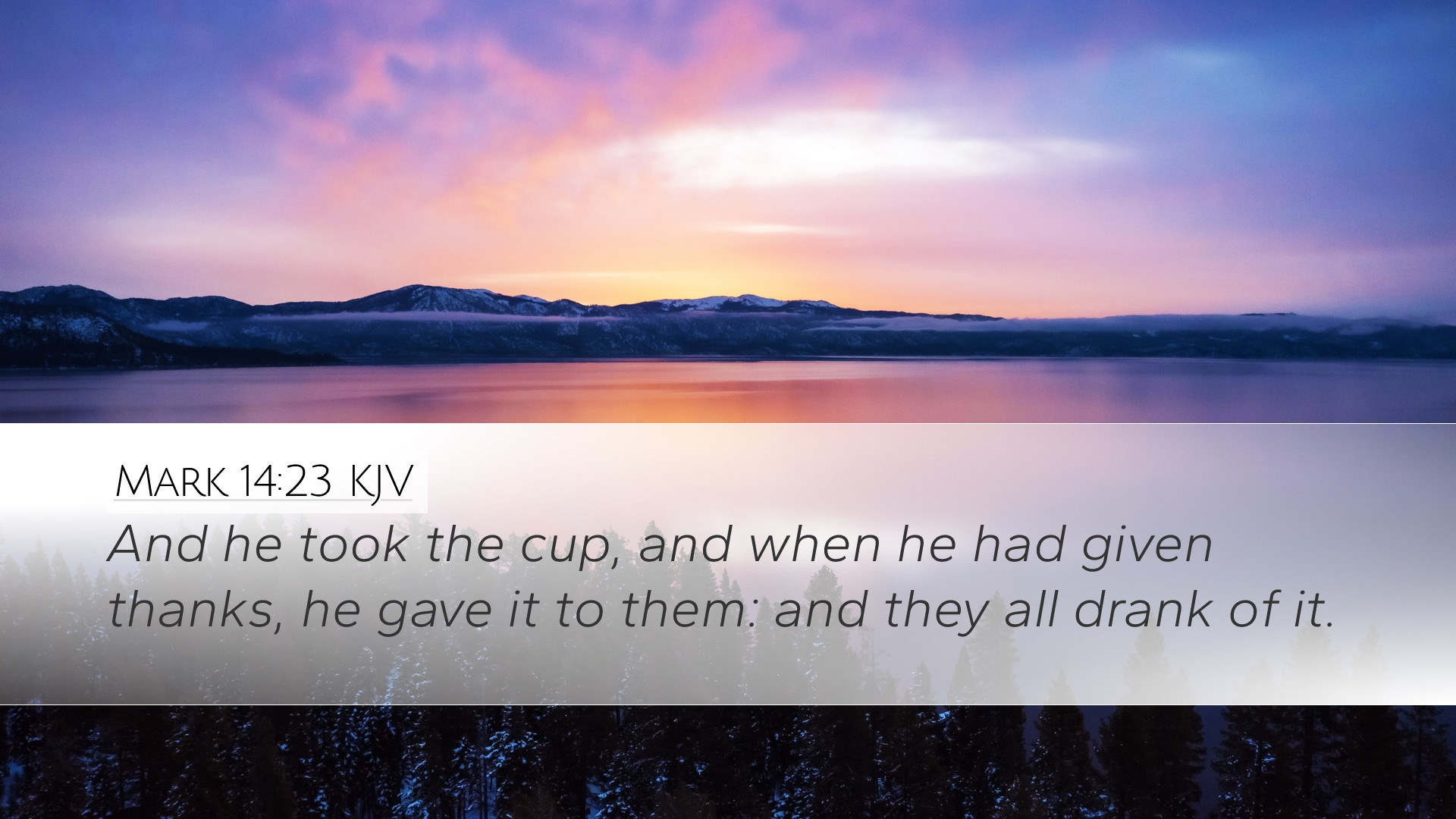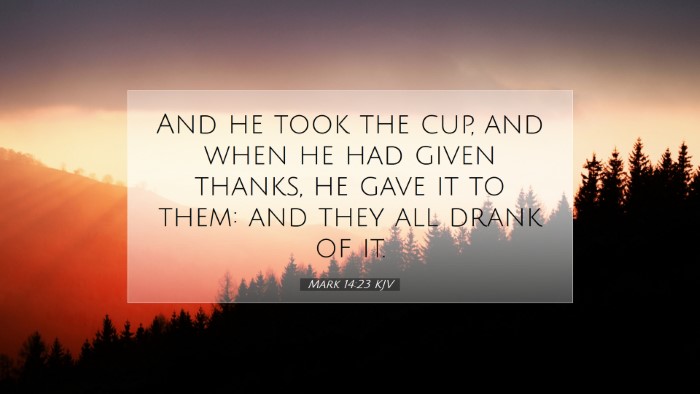Commentary on Mark 14:23
Verse: "And he took the cup, and when he had given thanks, he gave it to them: and they all drank of it."
Introduction
The institution of the Lord's Supper marks a pivotal moment in Christian worship and theology. In Mark 14:23, the act of Jesus taking the cup signifies more than just a physical action; it encapsulates profound theological truths about sacrifice, covenant, and community. This commentary synthesizes insights from respected public domain sources to delve into the richness of this verse.
Contextual Background
This verse occurs during the Last Supper, a critical event in the Passion narrative. It precedes Jesus’ crucifixion, serving both as a testament to His impending sacrifice and as the establishment of a new covenant in His blood. Understanding the Jewish Passover background enhances the theological depth of this text.
Passover Significance
The Last Supper occurs within the context of Passover, a celebration of Israel's deliverance from Egypt. Matthew Henry emphasizes that Jesus transforms this customary meal into a sacrament, establishing a new commemorative act that points to His sacrificial death.
Analysis of the Verse
Taking the Cup
Jesus taking the cup signifies His role as the mediator of a new covenant, reflective of the old covenant's sacrificial system. Albert Barnes notes that the cup represents both a physical element and a spiritual truth—the blood of the new covenant which would be shed for many.
Giving Thanks
With the phrase “when he had given thanks”, we see a profound acknowledgment of gratitude that serves as a model for Christian prayer. Adam Clarke points out that gratitude to God even before the act of sacrifice emphasizes Jesus’ obedience to the Father and His deep understanding of the divine plan. The act of thanksgiving prior to instituting the Supper invites believers into a posture of worship and remembrance.
Distribution of the Cup
Jesus then gave it to them, a significant act of sharing that signifies fellowship and inclusion in the new covenant. This communal aspect is crucial; it suggests that the benefits of Jesus' atoning work are extended to all who partake. Matthew Henry indicates that this action establishes a profound connection among the disciples, revealing the essence of unity in Christ.
Universal Participation
The phrase “they all drank of it” reinforces the idea that the message of salvation through Christ is universal. Albert Barnes expounds that this act is an invitation to all believers to enter into the communion of saints. It signifies that the sacrifice of Christ is for the many, fulfilling the prophetic offices of the Messiah.
Theological Implications
New Covenant
This moment marks the inauguration of the new covenant as prophesied in Jeremiah 31:31-34. The cup not only symbolizes Jesus' blood but also represents the essence of the covenant, which emphasizes forgiveness and relationship with God. Adam Clarke highlights the transformational aspect of the new covenant that redefines the believer's identity and alignment with God's will.
Christ's Sacrifice
In drinking from the cup, the disciples symbolically accept the reality of Christ’s impending sacrifice. This anticipatory act adds a layer of poignancy to their communion. Matthew Henry notes that understanding this sacrifice is vital for grasping the gravity of sin and the depth of God’s love expressed in the cross.
Community in Worship
The Lord’s Supper emphasizes community. Adam Clarke articulates that fellowship with Christ is inseparable from fellowship with one another. Participating in communion is an expression of the body of Christ working in unity, highlighting the importance of communal worship in the life of the church.
Practical Application
Approaching Communion
Believers are called to approach the Lord's Table with reverence and understanding. The act of drinking from the cup is not merely ritualistic; it requires a deep, reflective engagement with its meaning. Matthew Henry encourages pastoral reflection on the significance of this sacrament as a means of grace, reinforcing faith among congregants.
Living Out the Covenant
For pastors and theologians, this verse drives home the concept of living in light of the new covenant. It is essential to teach congregations about their identity as part of the body of Christ. This underscores a missional aspect, compelling believers to reach out and share the message of salvation with others.
Gratitude in Worship
Practicing thanksgiving as modeled by Jesus fosters a culture of gratitude in worship. Cultivating a spirit of appreciation for God’s grace deepens faith and encourages spiritual growth. Albert Barnes notes that acknowledging God’s work in our lives is central to authentic Christian living.
Conclusion
Mark 14:23 serves as a rich theological cornerstone that invites pastoral reflection, scholarly exploration, and personal spiritual growth. Through Jesus' actions at the Last Supper, a new understanding of covenantal relationship with God is presented, showcasing the call to community, gratitude, and a deeper engagement with the sacrifice of Christ. It is an invitation for all to partake in the life-giving presence of Jesus, reminding believers of their identity and mission in the world.
References
- Matthew Henry's Commentary on the Whole Bible
- Albert Barnes' Notes on the New Testament
- Adam Clarke's Commentary on the Bible


